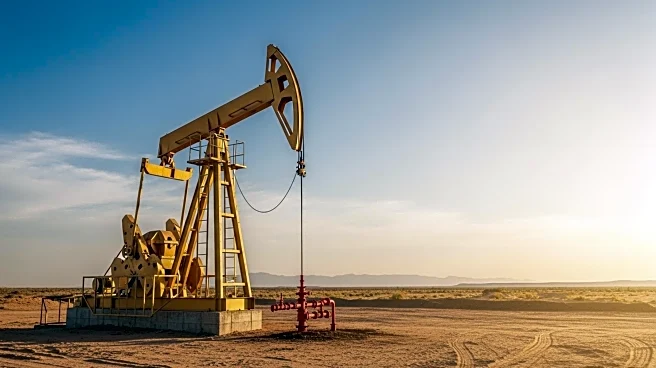What's Happening?
Saudi Aramco, the world's largest oil company, has announced its capability to maintain oil production at its maximum capacity of 12 million barrels per day (bpd) for a year without requiring additional investments. This statement was made by Amin Nasser, the chief executive of Saudi Aramco, during the Energy Intelligence Forum in London. The announcement comes amid concerns from analysts regarding the reversal of OPEC+ cuts, which have left the declining spare capacity vulnerable to supply shocks. Saudi Arabia holds the largest spare capacity globally, estimated at over 2 million bpd, though it may be as low as between 600,000 bpd and 1 million bpd that can be quickly mobilized and sustained. Nasser highlighted the continued growth in global oil demand, projecting an increase of between 1.1 million bpd and 1.3 million bpd in 2025, with further growth expected next year.
Why It's Important?
The ability of Saudi Aramco to sustain high levels of oil production is significant for global energy markets, particularly as concerns about supply shocks and spare capacity persist. This announcement underscores Saudi Arabia's strategic role in stabilizing global oil supply and influencing market prices. The continued demand for oil, as projected by Aramco, suggests that hydrocarbons will remain a critical component of global energy consumption despite ongoing discussions about energy transition. This could impact U.S. energy policy and market dynamics, as American companies and policymakers navigate the balance between traditional energy sources and renewable alternatives. The reliance on oil underscores the need for long-term investments in supply to meet growing demand.
What's Next?
Saudi Aramco's strategy to remain dominant in oil production is likely to influence global energy policies and investments. As the company continues to leverage its massive resource base and low production costs, other oil-producing nations and companies may need to reassess their strategies to remain competitive. The emphasis on hydrocarbons as the backbone of global energy could lead to increased investments in oil infrastructure and exploration, potentially affecting U.S. energy markets and international relations. Additionally, the ongoing dialogue about energy transition may prompt further discussions on balancing traditional energy sources with sustainable alternatives.
Beyond the Headlines
The announcement by Saudi Aramco highlights the complex dynamics of the global energy transition. While there is significant hype around renewable energy, the reality on the ground suggests that hydrocarbons continue to play a vital role in meeting global energy needs. This raises ethical and environmental questions about the pace and nature of the energy transition, as well as the long-term sustainability of relying on fossil fuels. The discourse around energy addition versus transition may influence public policy and corporate strategies, as stakeholders consider the implications for climate change and economic development.









